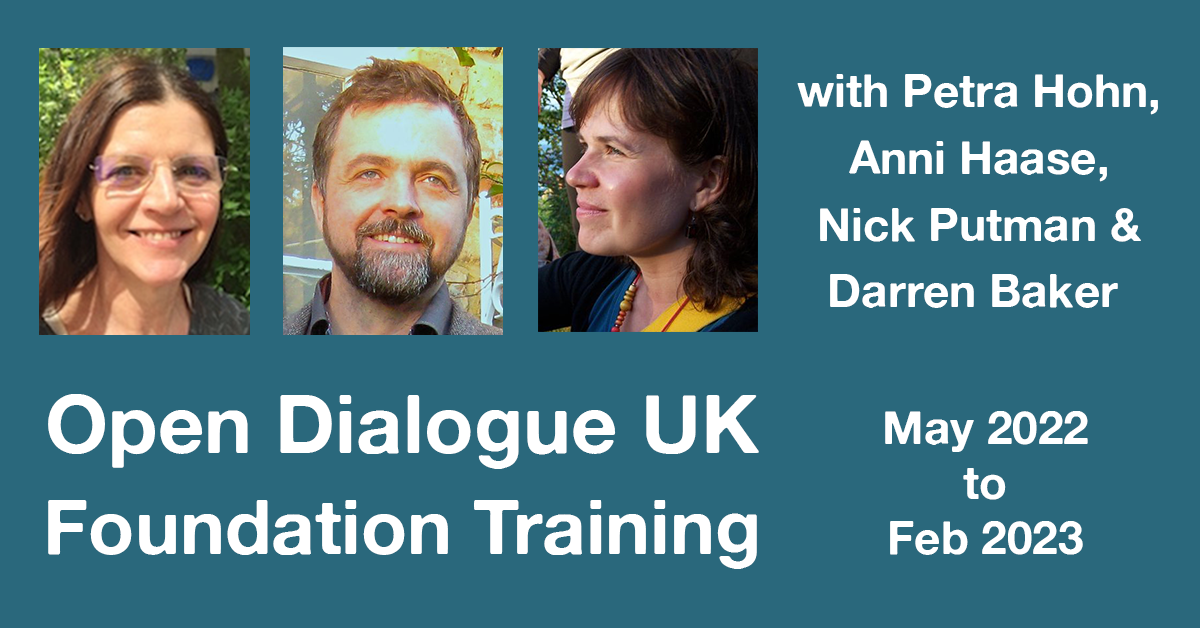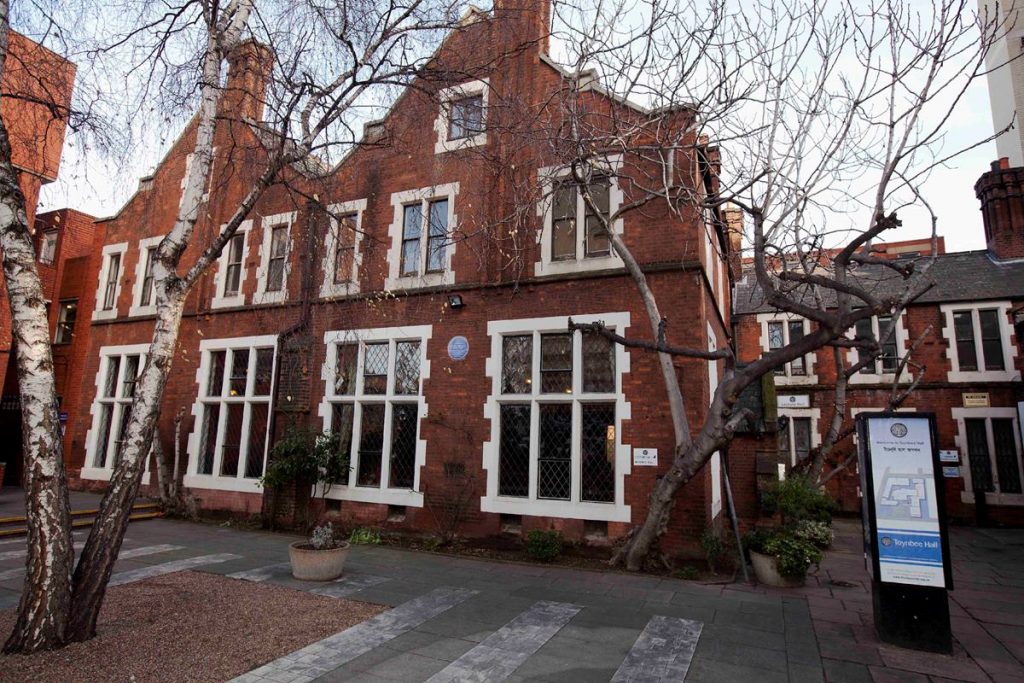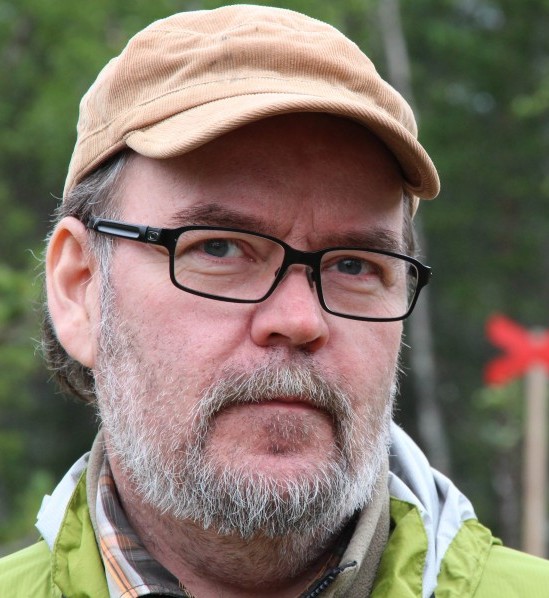Open Dialogue – Foundation Training
COMMENCING IN JANUARY 2025
ONLINE
for mental health professionals/teams, independent practitioners and peer workers
PLEASE NOTE: This training is also being run in person in London in 2025. For further details and to apply, please see this page.
The training can also be run on an in-house basis in the NHS and other mental health services nationally and internationally. For further details and enquiries please visit this page.
This foundation training is an internationally recognised programme for professionals working in public mental health services (including peer workers) and independent practitioners. It is the most widely used Open Dialogue training programme internationally, and has now been run by Open Dialogue UK on 17 occasions, in five different countries, including five times on an in-house basis in the NHS in the UK. Many of the materials in the training are based on those originally developed by Volkmar Aderhold and Petra Hohn, who began running Open Dialogue foundation trainings over 15 years ago, continually revising their materials based on what proved to be most effective in training professionals in public mental health care services across Germany and Switzerland. This programme was also one of the two main trainings used in the Parachute Project in New York.
The programme provides a thorough grounding in the practice of facilitating Open Dialogue network meetings, and participants are encouraged to start practicing before the end of the training, if they are able to (though such practice is not a required part of Open Dialogue training at foundation level). The emphasis in the training is on practice, and understanding the approach through engaging both personally and professionally in the training process. In other words, though a good deal of theory and specific skills are taught on the programme, the heart of the process is the dialogue between the participants (and trainers) and the ways in which they reflect on the approach and each other’s contributions. Open Dialogue is an embodied practice and so it is important for participants to engage emotionally as well as intellectually in the training process.
Training days typically consist of a mixture of exercises, role plays, presentations, handouts and discussions, and there is also a family of origin process, where participants explore their own family background. Reading is given after each block, rather than in advance, as practice comes before theory. The reading given will tend to follow the particular topics introduced on each block, and largely comes in the form of journal articles, which can be accessed online in PDF form, via the Open Dialogue international website. Because most of the theory is shared in the form of handouts and presentations during the training, and explored through dialogue in small and large groups, participants can access the theory that they need in order to practice through these means. For more detail on the content of the programme, please see below.
In mid 2020, due to the pandemic, we had to move our training programmes online, in order to maintain the training processes that were already underway. Initially there was some hesitancy in doing so, but we were very pleased to see how well the training worked online, with only minor adaptations needed for the online format. So we decided to run the training online again in 2021, 2022 and 2023 and have continued to have a positive experience of doing so. We plan to offer the training online annually from now onwards. We use Zoom as the software for our online trainings.
We are very pleased to have such an experienced training team for this programme. Anni Haase and Kari Valtanen from Lapland and Petra Hohn from Sweden will be joining Nick Putman as trainers. Further details on the trainers can be found below.
If you are interested in participating in this programme please submit your application by 30 September 2024.
Please note that this training is also being run in London in 2025. For further details, see this page.
Apply for Training
To apply for the training as a group please click here.
To apply for the training as an individual please click here.
Deadline for applications: 30 Sep 2024
Dates for Training
30-31 Jan 2025
6-7 Mar 2025
3-4 Apr 2025
1-2 May 2025
28-30 May 2025
3-4 July 2025
10-12 Sep 2025
6-7 Nov 2025
4-5 Dec 2025
Each training day will start at 09.00 and finish at 17.00 UK time (GMT/BST).
Training Fees
£3,150 per person
(inc VAT)
or 4 installments of £870
Testimonials on our Foundation Training
Enquiries
Please contact us by clicking here.
The training programme will take place online and will consist of 20 days over the course of 2025, divided into 9 blocks. Among the topics covered will be the following:
- The Western Lapland service
- The 7 principles of Open Dialogue
- Reflecting and reflecting teams
- The facilitation of network meetings
- The key elements of dialogic practice
- Circular and anticipatory questions
- Metacommunication
- The ‘exploring your relational world’ process
- Working with the meaning and context of behaviour
- Communicating difficult feelings
- Working in crisis situations
- Working with people experiencing psychosis
- Working with risk
If you require more detail on the curriculum of this training programme, please contact us.
Training Team
 Nick Putman is a registered psychotherapist and a certified Open Dialogue practitioner and trainer, having completed a two year training in the Open Dialogue approach with Mary Olson and others in the US and a three year trainer’s training programme in London with Jaakko Seikkula and others. He is the founder of Open Dialogue UK, which established the first full training in the Open Dialogue approach outside of Western Lapland. Nick has visited the Open Dialogue service in Western Lapland on a number of occasions to study the approach and the structure of the service. He has more than 25 years experience working in a variety of mental health settings, and considerable experience working with people experiencing psychosis and their families. Nick has been a trainer on either full or foundation level Open Dialogue trainings run in the UK, Australia, France, Estonia and Belgium.
Nick Putman is a registered psychotherapist and a certified Open Dialogue practitioner and trainer, having completed a two year training in the Open Dialogue approach with Mary Olson and others in the US and a three year trainer’s training programme in London with Jaakko Seikkula and others. He is the founder of Open Dialogue UK, which established the first full training in the Open Dialogue approach outside of Western Lapland. Nick has visited the Open Dialogue service in Western Lapland on a number of occasions to study the approach and the structure of the service. He has more than 25 years experience working in a variety of mental health settings, and considerable experience working with people experiencing psychosis and their families. Nick has been a trainer on either full or foundation level Open Dialogue trainings run in the UK, Australia, France, Estonia and Belgium.


 Anni Haase is a psychologist, psychotherapist and Open Dialogue practitioner and trainer. Currently she works at Keropudas outpatient services in Western Lapland, Finland, where Open Dialogue in psychiatry was born. Anni works with families and social networks but also practices individual psychotherapy in the spirit of a need adapted approach. She is also leading a training for peer workers with her colleagues and participates in a supervision group for peer workers. Anni gives individual supervision to workers at Keropudas Hospital. Previously Anni worked as an occupational psychologist in Rovaniemi and Tornio (2000-2004). Before Keropudas she worked as a psychologist in a family counselling centre in Tornio (2004-2010), which was strongly influenced by Open Dialogue trainings in the region. Anni has completed psychology teacher’s pedagogical studies (2005), and has specialised in family counselling (2007) and sensorimotor trauma therapy (2010). Anni has participated as a trainer in several trainings internationally including trainings run in Australia, the UK, Belgium, Spain and the US.
Anni Haase is a psychologist, psychotherapist and Open Dialogue practitioner and trainer. Currently she works at Keropudas outpatient services in Western Lapland, Finland, where Open Dialogue in psychiatry was born. Anni works with families and social networks but also practices individual psychotherapy in the spirit of a need adapted approach. She is also leading a training for peer workers with her colleagues and participates in a supervision group for peer workers. Anni gives individual supervision to workers at Keropudas Hospital. Previously Anni worked as an occupational psychologist in Rovaniemi and Tornio (2000-2004). Before Keropudas she worked as a psychologist in a family counselling centre in Tornio (2004-2010), which was strongly influenced by Open Dialogue trainings in the region. Anni has completed psychology teacher’s pedagogical studies (2005), and has specialised in family counselling (2007) and sensorimotor trauma therapy (2010). Anni has participated as a trainer in several trainings internationally including trainings run in Australia, the UK, Belgium, Spain and the US. Kari Valtanen is a Child and Adolescent Psychiatrist and Family Therapist, living in Rovaniemi, Finland, at the Arctic Circle. He is working with the Open Dialogue team at the Adolescent Psychiatric Unit in Western Lapland. Kari has experience in consulting with child & adolescent mental health services and child protection in different municipalities in Lapland. He has been teaching family and narrative therapy, collaborative, and dialogical practice for several years. Kari has held three year Open Dialogue trainings with his colleagues locally in Lapland and has been a trainer on several Open Dialogue trainings internationally including those run in the UK, Italy, Australia, France, Japan, US and Canada. He has also been a trainer on five Open Dialogue trainers’ training programmes.
Kari Valtanen is a Child and Adolescent Psychiatrist and Family Therapist, living in Rovaniemi, Finland, at the Arctic Circle. He is working with the Open Dialogue team at the Adolescent Psychiatric Unit in Western Lapland. Kari has experience in consulting with child & adolescent mental health services and child protection in different municipalities in Lapland. He has been teaching family and narrative therapy, collaborative, and dialogical practice for several years. Kari has held three year Open Dialogue trainings with his colleagues locally in Lapland and has been a trainer on several Open Dialogue trainings internationally including those run in the UK, Italy, Australia, France, Japan, US and Canada. He has also been a trainer on five Open Dialogue trainers’ training programmes.